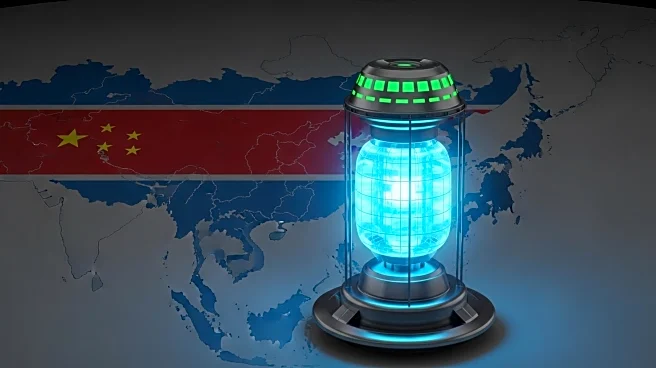What's Happening?
China's recent diplomatic engagement with North Korea, marked by a summit between Xi Jinping and Kim Jong Un, signals a potential shift in Beijing's stance on North Korea's nuclear status. During the summit, official statements omitted any mention of denuclearization, a departure from previous meetings. This change suggests China's tacit acceptance of North Korea as a nuclear power, aligning with its strategic interests in the region. Historically, China has supported denuclearization efforts, voting for UN sanctions against North Korea in 2016 and 2017. However, deteriorating US-China relations and strategic rivalry have led Beijing to scale back cooperation on curbing Pyongyang's nuclear ambitions. This shift is further complicated by China's concerns over AUKUS, a program involving the US, UK, and Australia, which China views as a step towards nuclear proliferation.
Why It's Important?
China's acceptance of North Korea's nuclear status could have significant implications for regional security and global nonproliferation efforts. It may embolden North Korea to continue its nuclear development, potentially triggering a nuclear arms race in East Asia. South Korea and Japan might feel compelled to develop their own nuclear arsenals, especially amid doubts over the US nuclear umbrella. This development could destabilize the region and alter the balance of power, challenging US influence and strategic interests. Additionally, China's stance may encourage other nations to pursue nuclear capabilities, exploiting great-power rivalries for their own proliferation ambitions.
What's Next?
The shift in China's policy may lead to closer ties between China and North Korea, potentially involving economic cooperation and military alliances. This could complicate US diplomatic efforts to engage North Korea and address nuclear proliferation. The US may need to reassess its strategy in the region, considering the potential for increased nuclear capabilities among its allies. Furthermore, China's actions could prompt international discussions on nonproliferation norms and the role of major powers in maintaining global security.
Beyond the Headlines
China's strategic interests in accepting North Korea's nuclear status reflect broader geopolitical dynamics, including its vision for a world order less dominated by the US and its allies. This shift highlights the complex interplay between national security, regional stability, and global nonproliferation norms. It raises ethical questions about the responsibilities of major powers in preventing nuclear proliferation and maintaining peace. The situation underscores the need for diplomatic engagement and multilateral cooperation to address the challenges posed by nuclear proliferation.










